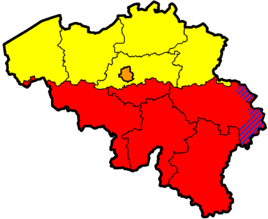Welcome to the Virtual Education Wiki ~ Open Education Wiki
Belgium: Difference between revisions
No edit summary |
Grego lucas (talk | contribs) No edit summary |
||
| Line 74: | Line 74: | ||
---- | ---- | ||
[[Internal evaluation Belgium]] | |||
---- | |||
> [[Countries]] | > [[Countries]] | ||
[[Category:Europe]] | [[Category:Europe]] | ||
[[Category:European Union]] | [[Category:European Union]] | ||
Revision as of 09:03, 8 January 2009
Partners situated in Belgium:
- AVNet - K.U.Leuven
- EuroPACE
- Audiovisual Technologies, Informatics and Telecommunications bvba (ATiT)
Note: One of the universities in Belgium is K.U.Leuven.
Country in a nutshell
Belgium is a federal state in Europe with a constitutional monarchy, founded in 1830. Its capital is Brussels and it has a population of 10 511 382 people in a total area of 30 528 km². Belgium is a double federation of:

- 3 Communities which are responsible for the person-related issues such as education, welfare, public health and culture:
- the Dutch-speaking Community / Vlaamse Gemeenschap: Government, Ministry and Parliamant
- the French-speaking Community / Communauté Française: Government, Ministry and Parliamant
- the German-speaking Community / Deutschsprachige Gemeinschaft: Ministry and Parliament
- 3 Regions which are responsible for the territorial issues such as economy, infrastructure, agriculture, environment and employment
- the Flemish Region
- the Walloon Region
- the Brussels-Capital Region (officially bilingual)
- There are four language areas:
- the Dutch area: the provinces in Flanders: Antwerp, Limburg, Flemish Brabant, West Flanders, East Flanders
- the French area: the provinces in Wallonia: Hainaut, Walloon Brabant, Namur, Luxembourg, Liège
- the German area: the 9 municipalities of the “East Cantons” / Eupen-Malmedy
- the bilingual area in Brussels-Capital with 19 municipalities
Country education policy
The Belgian Constitution stipulates that everyone has the right to education and therefore established compulsory education. Belgium also provides that access to education is free of charge up to the end of secondary education.
As a result of the constitutional reform in Belgium the Dutch speaking and the French-speaking higher education systems were separated.
Two groups organise the educational structure: the public sector (the communes, provinces and communities) and the private sector. In the public sector there are 3 educational networks:
- community schools (neutral on religious, philosophical or ideological convictions)
- subsidised publicly run schools (organized by communes and provinces)
- subsidised privately run schools: denominational schools and schools which are not affiliated to a particular religion: the Freinet schools, Montessori schools or Steiner schools, which adopt particular educational methods and are also known as ‘method schools’.
Education that is organised for and by the government (community education and municipal and provincial education) is known as publicly run education. Recognised education organised on private initiative is called privately run education.
Because the educational system differs in Flanders and Wallonie, we decided to create two different pages, one for Flanders and one for Wallonie.
Related wiki pages
For more examples visit this page: Belgium Research or view our WORD document with detailed information for most of our examples.
Furthermore, for corporate e-learning there's the Belgian network for Open & Distance learning (BE-ODL).
References
- Wikipage on Belgium
- Wikipage on the communities, regions and language areas of Belgium
- Information about Higher Education on Belgium.be
- The web site for the ministry of Education and Formation
- “EDUCATION IN FLANDERS - The Flemish educational landscape in a nutshell”, PDF
- Wikipedia’s page on Belgium Universities and Colleges
- Higher Education in Flanders Register
- Study in Flanders
- Introduction to (initial) accreditation (EN)
- Accreditation (EN)
- Accredidation Framework for Flanders (EN)
- Automatic recognition of qualifications (EN)
- Joint declaration automatic recognition qualifications December 2005 (PDF) (EN)
Interesting country reports concerning elearning:
State of the art of e-learning in Belgium